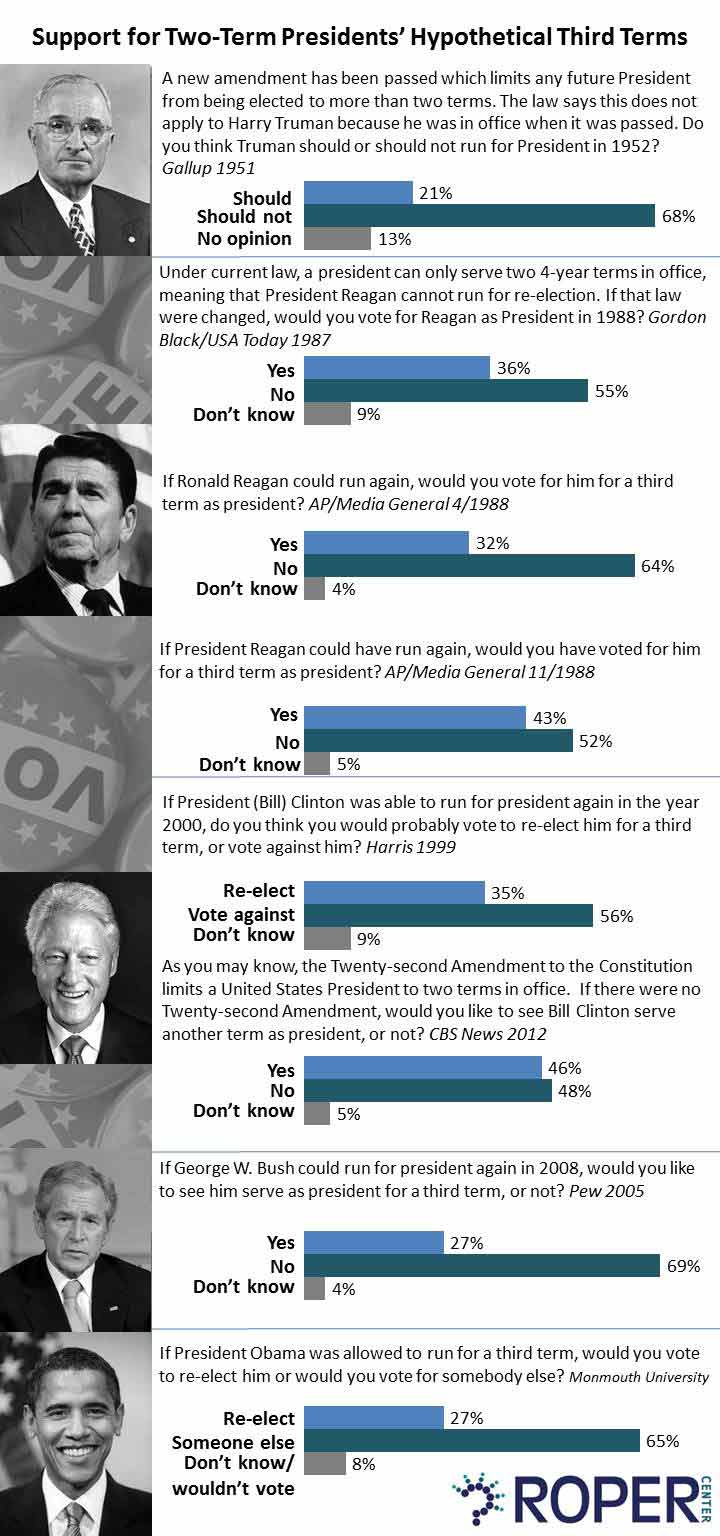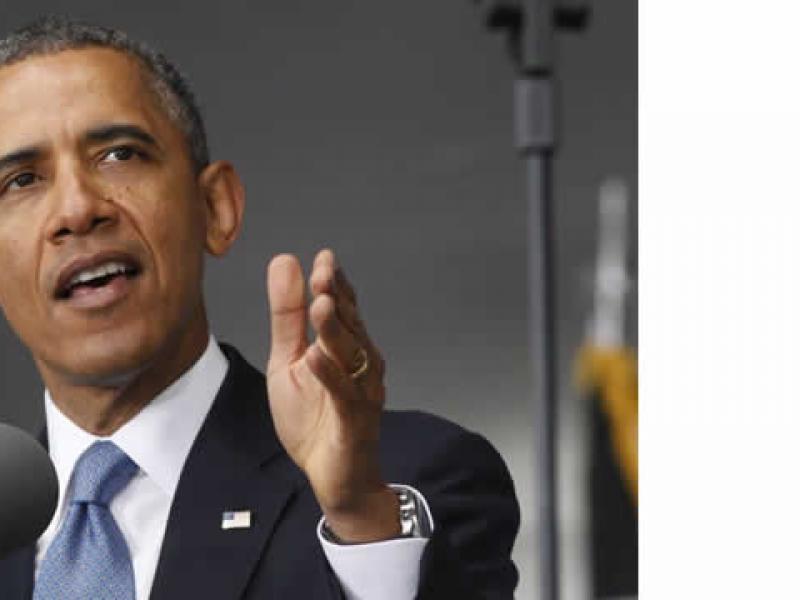Addressing the African Union last month, Barack Obama said, “I actually think I'm a pretty good president. I think if I ran, I could win. But I can't." Obama is prevented from re-election by the 22nd Amendment, which has limited Presidents to two terms since 1951. The public is supportive of this restriction, but more divided in their perception of the effect of the two-term cap on presidential second terms. From the Roper Center for Public Opinion Research Archives:
FDR: Happy Days Are Here Again - and Again
George Washington established the standard that presidents would limit themselves to two terms in office, but no law prevented third terms until the 22nd Amendment was passed in reaction to Franklin D. Roosevelt's unprecedented four successful elections. Pollsters started asking about an amendment in 1939, as FDR faced his third election in 1940. At this time, a slim majority of 51% opposed such an amendment and 37% supported it. 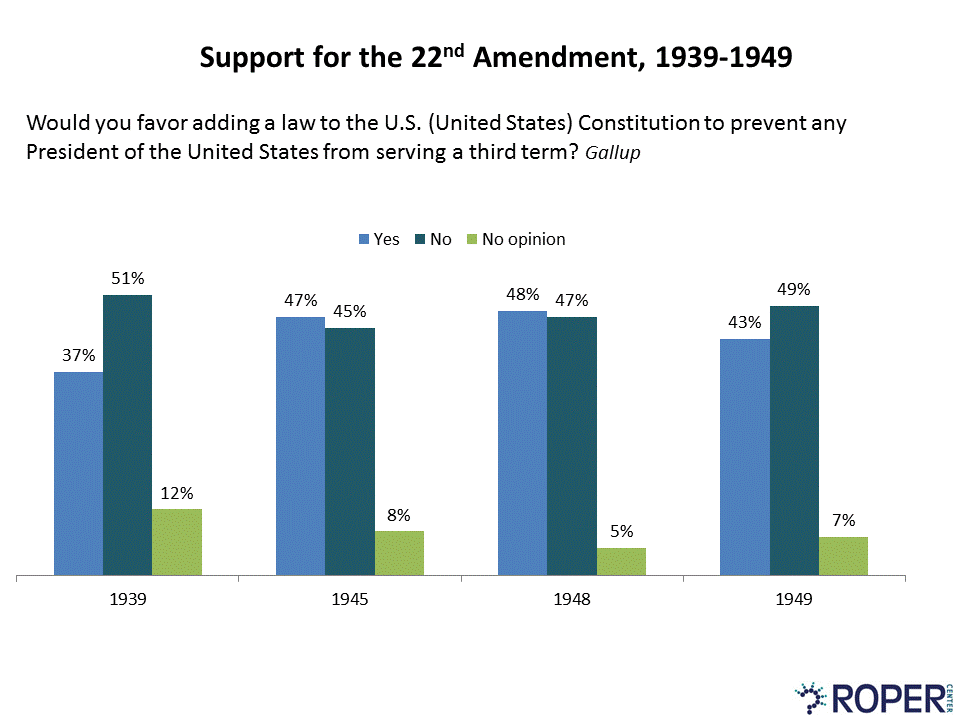 In 1940, when given three options in a Roper/Fortune poll, only 13% of the country thought the idea that a president should not hold office for three terms was a silly and outworn tradition. Twenty-nine percent believed that never under any conditions should a president hold office for three terms, but 52% agreed that, while it may not generally be a good idea for a president to serve three terms, there should be no rule preventing him at a time of national crisis. The situation in Europe was likely such a crisis for many Americans, as Roosevelt won the 1940 election with 55% of the vote. In a 1944 Gallup poll, 54% favored adding a law to the Constitution to prevent any future President from being reelected if he has already served two terms. The exception for Roosevelt was made explicit with the phrase “after this year's election" for half the respondent sample, and among this group, support was 62%. Despite majority approval of limiting presidential terms, Roosevelt won again in 1944, garnering 53.4% of the popular vote. After this final victory, the country became divided on the issue, even as the amendment passed Congress in 1947 and was ultimately ratified in 1951.
In 1940, when given three options in a Roper/Fortune poll, only 13% of the country thought the idea that a president should not hold office for three terms was a silly and outworn tradition. Twenty-nine percent believed that never under any conditions should a president hold office for three terms, but 52% agreed that, while it may not generally be a good idea for a president to serve three terms, there should be no rule preventing him at a time of national crisis. The situation in Europe was likely such a crisis for many Americans, as Roosevelt won the 1940 election with 55% of the vote. In a 1944 Gallup poll, 54% favored adding a law to the Constitution to prevent any future President from being reelected if he has already served two terms. The exception for Roosevelt was made explicit with the phrase “after this year's election" for half the respondent sample, and among this group, support was 62%. Despite majority approval of limiting presidential terms, Roosevelt won again in 1944, garnering 53.4% of the popular vote. After this final victory, the country became divided on the issue, even as the amendment passed Congress in 1947 and was ultimately ratified in 1951.
Believers in the Status Quo: Two Four-Year Terms
More than two-thirds of the public did not think Harry Truman, the last president eligible to be elected to a third term, should run for re-election in 1952. However, given that Truman's approval ratings stood at a dismal 27% in the same poll, this result likely reveals more about Truman's support than that for the 22nd Amendment. By 1956, polling showed the country solidly in favor of the amendment, with only a third favoring repeal through the mid-1980s and even lower support in 2013. 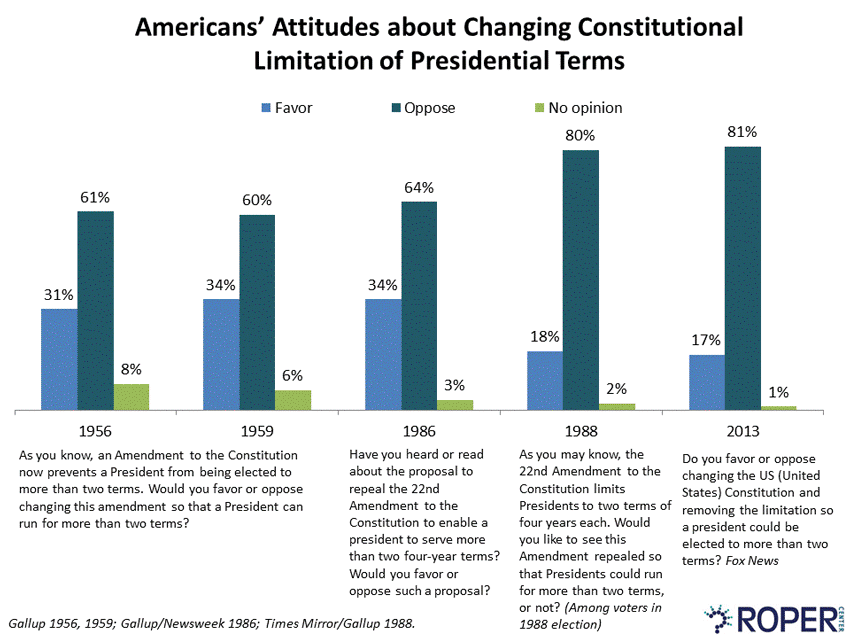 After the two-term presidency of Dwight Eisenhower, occupants of the Oval Offices changed with shocking frequency through the sixties and seventies. Alarmed by this state of affairs, a bipartisan group led by former Secretary of State Cyrus R. Vance and former Secretary of the Treasury William E. Simon formed the National Committee for a Single Six-Year Presidential Term. A 1980 Harris poll found a surprisingly large minority of 43% favored this idea, though a majority (54%) opposed. In contrast, a 1986 Gallup poll found only a quarter in support. A 1991 Gallup poll which provided arguments for and against a single six-year term found that just 31% were in favor because “limiting a President to one term of six years would best serve the national interest because he could devote all his energies to solving national problems rather than spending a lot of time trying to get re-elected," while 61% opposed because “they feel it takes a president a long time learning how to do his job and that knowing that he will have to seek re-election will make him answerable to the wishes of the people." In Time/CNN/Yankelovich polls in 1990 and 1994, only under a quarter of the public favored limiting the President to one term (of unspecified length) in office, while about seven in ten opposed. The idea of a six-year single term was resurrected last year by Larry Summers in a Washington Post Op-Ed, but public opinion has not been measured again.
After the two-term presidency of Dwight Eisenhower, occupants of the Oval Offices changed with shocking frequency through the sixties and seventies. Alarmed by this state of affairs, a bipartisan group led by former Secretary of State Cyrus R. Vance and former Secretary of the Treasury William E. Simon formed the National Committee for a Single Six-Year Presidential Term. A 1980 Harris poll found a surprisingly large minority of 43% favored this idea, though a majority (54%) opposed. In contrast, a 1986 Gallup poll found only a quarter in support. A 1991 Gallup poll which provided arguments for and against a single six-year term found that just 31% were in favor because “limiting a President to one term of six years would best serve the national interest because he could devote all his energies to solving national problems rather than spending a lot of time trying to get re-elected," while 61% opposed because “they feel it takes a president a long time learning how to do his job and that knowing that he will have to seek re-election will make him answerable to the wishes of the people." In Time/CNN/Yankelovich polls in 1990 and 1994, only under a quarter of the public favored limiting the President to one term (of unspecified length) in office, while about seven in ten opposed. The idea of a six-year single term was resurrected last year by Larry Summers in a Washington Post Op-Ed, but public opinion has not been measured again.
Lame Ducks and Second Term Curses
Since the adoption of the 22nd Amendment, presidents in their second term have been widely considered to suffer diminished power, particularly after the second midterm elections. The contrary view also has proponents who argue that, without the need to win re-election, presidents are freer to act. Political observers agree, however, that “[i]t is almost a truism that second terms are less successful than first terms," as Adam Clymer wrote in the New York Times. The public, on the other hand, does not appear to perceive an overall decrease in effectiveness in presidential second terms. Most Americans saw no difference in President Reagan's effectiveness in his first and second terms in a 1985 Gallup poll. In a 1997 ABC News/Washington Post, 37% of the public thought Clinton was doing a better job in his second term, 22% a worse job, and 34% volunteered that he was doing about the same. In the case of George W. Bush, nearly half (48%) of the country thought he was doing a worse job in his second term, only 4% thought better, and 47% said about the same in a 2006 PSRA/Newsweek poll. But they did not necessarily tie that judgment to the fact of his second term - a slight majority of 53% said he still have to power to get things done, while a lower proportion (42%) saw him as a lame duck who had lost his power. Comparing attitudes about the second terms of the last two presidents, just over half thought both Bush and Obama would be better presidents as a result of the experience of their first terms, while perceptions of effectiveness were more varied.
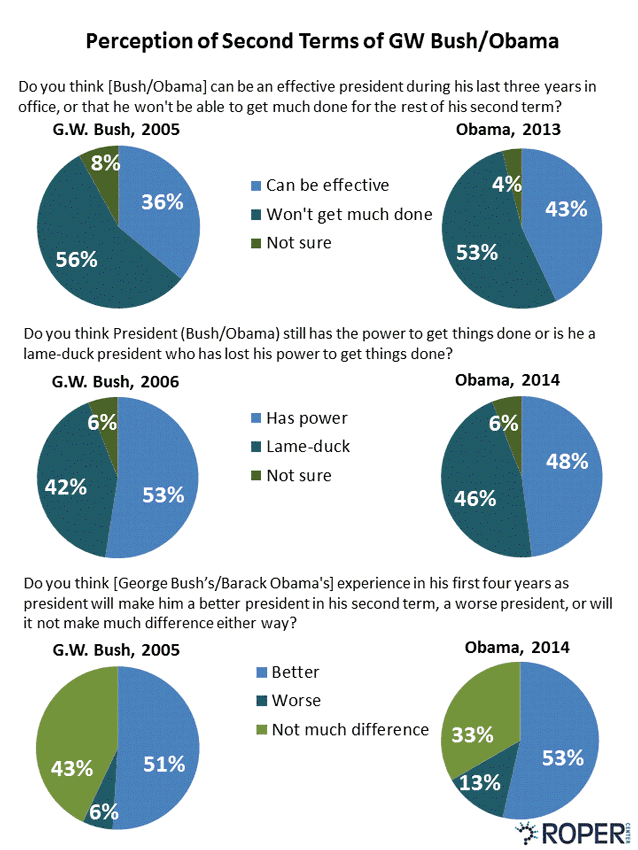 “I think if I ran, I could win."
“I think if I ran, I could win."
If Obama was correct, he would be the first since Roosevelt to garner such support. In polls during their second terms, both Ronald Reagan and Bill Clinton would have been supported in a hypothetical third term by only about a third of the country - despite the fact that this pair were the only post-WWII two-term presidents to have higher approval ratings in their second terms than their first. Just 27% of Americans in a Monmouth University poll say they would vote for Obama in a third term, the same proportion as said this about George Bush. Perhaps Obama simply needs to wait. Both Reagan and Clinton third terms were supported by more of the public in later polls. 